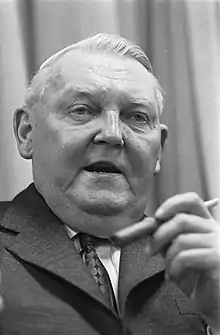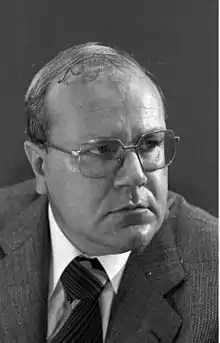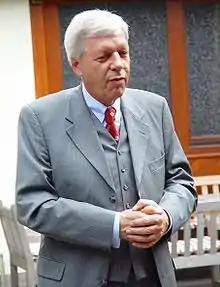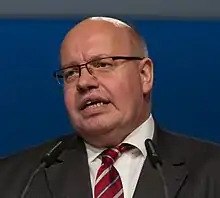Federal Ministry for Economic Affairs and Energy
The Federal Ministry for Economic Affairs and Energy (German: Bundesministerium für Wirtschaft und Energie), abbreviated BMWi, is a cabinet-level ministry of the Federal Republic of Germany. It was previously known as the "Ministry of Economy". It was recreated in 2005 as "Ministry of Economics and Technology" after it had previously been merged with other ministries to form the Federal Ministry for Economics and Labour between 2002 and 2005. The ministry is advised by the Council of Advisors on Digital Economy.
| Bundesministerium für Wirtschaft und Energie (BMWi) | |
 | |
| Agency overview | |
|---|---|
| Formed | 23 October 1917 as the Reichswirtschaftsamt |
| Jurisdiction | Government of Germany |
| Headquarters | Berlin/Bonn |
| Employees | 1,500 |
| Annual budget | €10.568 billion (2020)[1] |
| Minister responsible |
|
| Website | www |
History
The historical predecessor of the current Federal Ministry for Economic Affairs and Energy was the Reichswirtschaftsamt (Reich Economic Office), founded in 1917. In 1919, this became the Reichswirtschaftsministerium (Reich Ministry of Economy), which existed until 1945.
In postwar occupied Germany, its functions were exercised by the Administrative Office of Economy (German: Verwaltungsamt für Wirtschaft) between 1946 and 1949. After the founding of the Federal Republic of Germany, the Federal Ministry of Economics (German: Bundesministerium für Wirtschaft) existed from 1949 to 1998. From May 1971 to December 1972, it was temporarily merged with the Federal Ministry of Finance, in the Federal Ministry of Economics and Finance. In 1998 the technology section of the Ministry of Research was added, making it the Federal Ministry of Economics and Technology. Between 2002 and 2005, it was merged with parts of the former Ministry of Labour and Social Affairs, in Federal Ministry for Economics and Labour. In the cabinet under Angela Merkel, the two parts were once again split up in 2005, so that there was, once again, a Federal Ministry of Economics and Technology.
Structure

The Ministry is organised into 9 departments and one central department.
- Central Administration – Z
- Political Staff and Policy Planning - L
- European Policy – E
- Economic Policy – I
- Energy Policy: Heating and Efficiency – II
- Energy Policy: Electricity and Grid – III
- Industrial Policy – IV
- External Economic Policy – V
- Digital und Innovation Policy – VI
- SME Policy - VII
The ministry is headquartered in Berlin.
Agencies
In addition to its own operations, the Ministry also oversees the following agencies:[2]
- Federal Cartel Office
- Federal Network Agency
- Federal Office of Economics and Export Control
- Federal Institute for Materials Research and Testing
- Federal Institute for Geosciences and Natural Resources
- German National Metrology Institute
Ministers and Secretaries of State
Ministers
Political Party: CDU CSU SPD FDP No party
| Name (Born–died) |
Portrait | Party | Term of Office | Chancellor (Cabinet) | ||
|---|---|---|---|---|---|---|
| Federal Minister for Economics | ||||||
| Ludwig Erhard (1897–1977) |
 |
CDU | 20 September 1949 | 16 October 1963 | Adenauer (I • II • III • IV • V) | |
| Kurt Schmücker (1919–1996) |
 |
CDU | 17 October 1963 | 30 November 1966 | Erhard (I • II) | |
| Karl Schiller (1911–1994) |
.jpg.webp) |
SPD | 1 December 1966 | 7 July 1972 | Kiesinger (I) Brandt(I) | |
| Helmut Schmidt (1918–2015) |
.jpg.webp) |
SPD | 7 July 1972 | 15 December 1972 | Brandt (I) | |
| Hans Friderichs (b. 1931) |
.jpg.webp) |
FDP | 15 December 1972 | 7 October 1977 | Brandt (II) Schmidt (I • II) | |
| Otto Graf Lambsdorff (1926–2009) |
.jpg.webp) |
FDP | 7 October 1977 | 17 September 1982 | Schmidt (II • III) | |
| Manfred Lahnstein (b. 1937) |
.jpg.webp) |
SPD | 17 September 1982 | 1 October 1982 | Schmidt (III) | |
| Otto Graf Lambsdorff (1926–2009) |
.jpg.webp) |
FDP | 4 October 1982 | 27 June 1984 | Kohl (I • II) | |
| Martin Bangemann (b. 1934) |
 |
FDP | 27 June 1984 | 9 December 1988 | Kohl (II • III) | |
| Helmut Haussmann (b. 1943) |
.jpg.webp) |
FDP | 9 December 1988 | 18 January 1991 | Kohl (III) | |
| Jürgen Möllemann (1945–2003) |
.jpeg.webp) |
FDP | 18 January 1991 | 21 January 1993 | Kohl (IV) | |
| Günter Rexrodt (1941–2004) |
FDP | 21 January 1993 | 26 October 1998 | Kohl (IV • V) | ||
| Federal Minister for Economics and Technology | ||||||
| Werner Müller (1946-2019) |
 |
No party | 27 October 1998 | 22 October 2002 | Schröder (I) | |
| Federal Minister for Economics and Labour | ||||||
| Wolfgang Clement (1940-2020) |
 |
SPD | 22 October 2002 | 22 November 2005 | Schröder (II) | |
| Federal Minister for Economics and Technology | ||||||
| Michael Glos (b. 1944) |
.jpg.webp) |
CSU | 22 November 2005 | 10 February 2009 | Merkel (I) | |
| Karl-Theodor zu Guttenberg (b. 1971) |
 |
CSU | 10 February 2009 | 28 October 2009 | ||
| Rainer Brüderle (b. 1945) |
 |
FDP | 28 October 2009 | 12 May 2011 | Merkel (II) | |
| Philipp Rösler (b. 1973) |
 |
FDP | 12 May 2011 | 17 December 2013 | ||
| Federal Minister for Economic Affairs and Energy | ||||||
| Sigmar Gabriel (b. 1958) |
 |
SPD | 17 December 2013 | 27 January 2017 | Merkel (III) | |
| Brigitte Zypries (b. 1953) |
.jpg.webp) |
SPD | 27 January 2017 | 14 March 2018 | Merkel (III) | |
| Peter Altmaier (b. 1958) |
 |
CDU | 14 March 2018 | Incumbent | Merkel (IV) | |
Ministry for Economy (1949–1998)
- Parliamentary State Secretaries
- 1967–1970: Klaus Dieter Arndt, SPD
- 1970–1971: Philip Rosenthal, SPD
- 1972: Rainer Offergeld, SPD
- 1972–1987: Martin Grüner, FDP/DVP
- 1983–1987: Rudolf Sprung, CDU
- 1987–1989: Ludolf-Georg von Wartenberg, CDU
- 1987–1993: Erich Riedl, CSU
- 1989–1992: Klaus Beckmann, FDP
- 1992–1998: Heinrich Leonhard Kolb, FDP
- 1993–1994: Reinhard Göhner, CDU
- 1994–1997: Norbert Lammert, CDU
- State Secretaries
- 1949–1951: Eduard Schalfejew
- 1951–1963: Ludger Westrick, no party
- 1958–1963: Alfred Müller-Armack, CDU
- 1963–1966: Wolfram Langer
- 1963–1968: Fritz Neef
- 1967–1972: Johann Baptist Schöllhorn
- 1968–1969: Klaus von Dohnanyi, SPD
- 1969–1978: Detlev Karsten Rohwedder, SPD
- 1972: Ernst Wolf Mommsen
- 1973–1991: Otto Schlecht
- 1979–1995: Dieter von Würzen
- 1991–1994: Johann Eekhoff
- 1994–1997: Johannes Ludewig
- 1995–1998: Lorenz Schomerus
- 1997–1998: Rudi Geil, CDU
- 1997–1998: Klaus Bünger
Ministry for Economics and Technology (1998–2002)
- Parliamentary State Secretaries
- 1998–2002: Siegmar Mosdorf, SPD
- State Secretaries
- 1998–2002: Alfred Tacke, SPD
- 1999–2002: Axel Gerlach
Ministry for Economics and Labour (2002–2005)
- Parliamentary State Secretaries
- 2002–2005: Gerd Andres, SPD
- 2002–2005: Rezzo Schlauch, Greens
- 2002–2005: Ditmar Staffelt, SPD
- State Secretaries
- 1999–2003: Axel Gerlach
- 2002–2004: Alfred Tacke, SPD
- 2002–2005: Rudolf Anzinger
- 2002–2005: Georg-Wilhelm Adamowitsch
- 2004–2005: Bernd Pfaffenbach
Ministry of Economics and Technology (2005–2013)
- Parliamentary State Secretaries
- 2005–2013: Peter Hintze, CDU
- 2005–2009: Dagmar Wöhrl, CSU
- 2005–2009: Hartmut Schauerte, CDU
- 2009–2013: Ernst Burgbacher, FDP
- 2009–2013: Hans-Joachim Otto, FDP
- State Secretaries
- 2005–2006: Georg-Wilhelm Adamowitsch
- 2005–2008: Joachim Wuermeling, CSU
- 2006–2009: Walther Otremba
- 2005–2011: Bernd Pfaffenbach
- 2008–2012: Jochen Homann
- 2009–2013: Bernhard Heitzer, FDP
- 2011–2013: Stefan Kapferer, FDP
- 2012–2013: Anne Herkes
Ministry for Economic Affairs and Energy (since 2013)
- Parliamentary State Secretaries
- 2013–2017: Brigitte Zypries, SPD
- since 2013: Uwe Beckmeyer, SPD
- since 2013: Iris Gleicke, SPD
- since 2017: Dirk Wiese, SPD
- State Secretaries
- since 2013: Rainer Baake, Greens
- since 2014: Matthias Machnig, SPD
- since 2013: Dr. Rainer Sontowski, SPD
References
- "Bundeshaushalt". www.bundeshaushalt.de. Retrieved 3 August 2020.
- The Ministry's Agencies
External links
 Media related to Bundesministerium für Wirtschaft und Energie at Wikimedia Commons
Media related to Bundesministerium für Wirtschaft und Energie at Wikimedia Commons